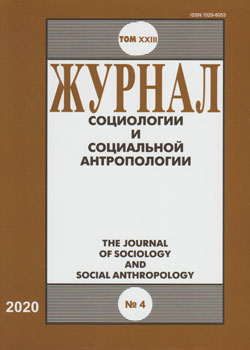Экологический активизм: мобилизация ресурсов «мусорных» протестов в России в 2018–2020 гг.
Аннотация
Литература
Akhremenko A.S., Filippov I.B (2019) Vliyanie silovogo podavleniya protesta na obsuzhdenie protestnoj akcii v social'nyh setyah [Impact of the Violent Suppression of Protest on its Discussion in Social Networks]. Monitoring obshchestvennogo mneniya: Ekonomicheskie i social'nye peremeny [Monitoring of Public Opinion: Economic and Social Changes], 5: 200–225 (in Russian). https://doi.org/10.14515/monitoring.2019.5.10
Blokov I.P. (2018) Okruzhayushchaya sreda i eyo ohrana v Rossii. Izmeneniyaza 25 let [Environment and its protection in Russia. Changes over 25 years]. Moscow: Sovet Grinpis (in Russian).
Chmel K.Sh., Klimova A.M., Mitrokhina A.M. (2020) Politizaciya ekologicheskogo diskursa v Arhangel'skoj oblasti na primere musornogo poligona okolo stancii Shies [The politicization of environmental discourse in Arkhangelsk region: the landfill siteat shies railroad station]. Zhurnal issledovaniy socialnoy politiki [The Journal of Social Policy Studies], 18(1): 83–98 (in Russian). https://doi.org/10.17323/727-0634-2020-18-1-83-98
Denisova A. (2017) Democracy, protest and public sphere in Russia after the 2011–2012 anti-government protests: digital media at stake. Media, Culture & Society, 7: 976–994. https://doi.org/10.1177/0163443716682075
Dennis J. (2019) Beyond Slacktivism Political Participation on Social Media. London: Palgrave Macmillan.
Enikolopov R., Makaryin A., Petrova M. (2015) Social'nye media i politicheskie protesty [Social media and political protests]. Vestnik obshchestvennogo mneniya [Public Opinion Bulletin], 3–4: 149–159. (in Russian). https://doi.org/10.24411/2070–5107–2015–00024
Howard P., Hussain M. (2013) Democracy's Fourth Wave? Digital Media and the Arab Spring. Oxford: Oxford University Press.
Ivanov D.A. (2013) Rol' virtual'nyh social'nyh setej v politicheskom proteste (Permskij sluchaj, 2011–2012 gg.) [The Role of Virtual Social Networks in Political Protest (Perm Case, 2011–2012)]. Vestnik Permskogo universiteta. Politologiya [Perm University Bulletin. Political science], 1: 52–59(in Russian).
Jil Q., Harlow S., Cui D., Wang Z. (2018) Discussing Environmental Issues in Chinese Social Media: An Analysis of Greenpeace China’s Weibo Posts and Audience Responses. The Journal of Social Media in Society, 1: 37–60.
Khovavko I.Y. (2020) Ekonomicheskij analiz «musornyh konfliktov» (na primere sovremennoj Rossii) [Economic analysis of “garbage conflicts” (The example of modern Russia)]. Ekonomicheskaya nauka sovremennoj Rossii [Economics of Contemporary Russia], 1: 55–67 (in Russian). https://doi.org/10.33293/1609-1442-2020-1
Kim Y., Shin E., Cho K. (2015) SNS Dependency and Community Engagement in Urban Neighborhoods. Communication Research, 1: 7–32. https://doi.org/10.1177/0093650215588786
Lee F. (2015) Internet, citizen self-mobilisation, and social movement organisations in environmental collective action campaigns: two Hong Kong cases. Environmental Politics, 2: 308–325. https://doi.org/10.1080/09644016.2014.919749.
Lee F., Chan J. (2018) Media and Protest Logics in the Digital Era: The UmbrellaMovement in Hong Kong.Oxford: Oxford University Press.
Madhavi T. (2018) Importance of Social Media to Create Environmental Awareness in Sustainable Higher Education System In: Narula S., Rai S, Sharma A. (eds.) Environmental Awareness and the Role of Social Media. Hershey: IGI Global: 72–81.
McCarthy J., Smith J., Zald M. (1996) Accessing Public, Media, Electoral, and Governmental Agendas. In: MacAdam D., McCarthy J., Zald M. (eds.) Comparative Perspectives on Social Movements: Political Opportunities, Mobilizing Structures, and Cultural Framings. Cambridge: Cambridge University Press: 291–311.
McCarthy J., Zald M. (1973) The Trend of Social Movements in America: Professionalization and Resource Mobilization. Morristown, N.J.: General Learning.
Nikolayenko O. (2019) Framing and counter-framing a Peace March in Russia: the use of Twitter during a hybrid war. Social Movement Studies, 5: 602–621.
Noskov I.A., Zheleztsov M.L., Ternovskov V.B. (2019) Problemy sostoyaniya okruzhayushchej sredyi prozhivaniya naseleniya v rajonah musornyh poligonov v sovremennoj Rossii [Problems of the state of the environment and population living in areas of landfills in modern Russia]. Nauchnyj aspekt [Scientific aspect], 2: 733–741(in Russian).
Platonov K.A., Yudina D.I. (2019) Povestka protestnyh onlajn-soobshchestv Sankt-Peterburgavo «VKontakte» [Agenda of Vkontakte online protest communities based in St Petersburg]. Monitoring obshchestvennogo mneniya: Ekonomicheskie i social'nye peremeny [Monitoring of Public Opinion: Economic and Social Changes], 5: 226–249 (in Russian). https://doi.org/10.14515/monitoring.2019.5.11
Rogov K. (2019) Informacionnyj razryv: otnoshenie k protestam kak dolgosrochnyj vyzov [Information divide: treating protests as a long-term challenge]. In: Rogov K. (ed.) Vstrechnaya mobilizaciya. Moskovskie protesty i regional'nye vybory — 2019. Analiticheskij doklad. Seriya «Liberal'naya missiya-Ekspertiza» [Counter mobilization. Moscow Protests and Regional Elections — 2019. Analytical report. Series “Liberal Mission-Expertise”. Issue 7]. Moscow: Fond «Liberal'naya missiya»:76–90 (in Russian).
Shamanova G.L., Mayorov O.V. (2019) Ekologicheskie protesty kak forma proyavleniya grazhdanskoj aktivnosti [Environmental protests as a form of civic activity]. Social'nye i gumanitarnye znaniya[Social and humanitarian knowledge], 5(3): 200–207 (in Russian).
Sokolov A.V., Levchenko I.A. (2017) Osobennosti privlecheniya resursov protestuyushchimi [Features of attraction f resources by protesters]. Vlast[Authority], 10: 53–59 (in Russian).
Sokolov A.V., Palagicheva A.V. (2018) Podmoskovnye protesty protiv musornyh poligonov: mekhanizmy politicheskoj demobilizacii [Moscow Region protests against landfills: mechanisms of political demobilization]. In: Evstifeev R. (ed.) Rossijskaya gosudarstvennost' v XXI veke: nacional'naya identichnost' iistoricheskaya pamyat' v usloviyah global'noj konkurencii. Materialy nauchno-prakticheskoj konferencii [Russian statehood in the XXI century: national identity and historical memory in the context of global competition. Materials of the scientific and practical conference]. Vladimir: Vladimir Branch of RANEPA: 190–194 (in Russian).
Theocharis Y. (2015) The Conceptualization of Digitally Networked Participation. Social Media + Society, July-December: 1–14. https://doi.org/10.1177/2056305115610140
Tsepilova O.D. (2019) Politicheskoe i social'no-ekonomicheskoe razvitie sovremennoj Rossii: ekologicheskie ogranicheniya i riski [Political and socio-economic development of modern Russia: environmental obstacles and risks]. Teleskop [Telescope],6: 20–27 (in Russian).
Tyutyundzhi I. (2012) Novyef ormy social'nogo aktivizma [New forms of social activism]. Sotsiologicheskiye issledovaniya [Sociological Studies], 5: 149–153 (in Russian).
Volkov D., Goncharov S. (2017) Rossijskij media landshaft: osnovnye tendencii ispol'zovaniya SMI [Russian media landscape: main trends in the use of the media]. levada-centr [Levada-Center] [https://www.levada.ru/2017/08/22/16440 ] (accessed: 10.11.2019) (in Russian).
Zald M., McCarty J. (eds.) (1987) Social Movements in an Organizational Society. New Brunswick, N.J.: Transaction Books.






